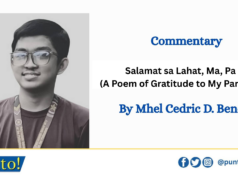Today, I filed a formal administrative complaint against the officials of the Office of the Ombudsman who violated my constitutional right to speedy disposition of cases. I also filed it to give justice to other 18 co-respondents charged in the Office of the Ombudsman in 1998 with various administrative and criminal cases by reason of our membership in the Land Registration Authority Computerization Pre-Qualification, Bids and Awards Committee (LRA-PBAC). This Committee spearheaded the study of the computerized system of land registration that is now taking effect in the Registries of Deeds nationwide.
In 1998, Preliminary Investigation of our cases proceeded, with the Ombudsman’s Fact Finding and Investigation Bureau (FFIB) as complainant .On April 17, 2002, complainant FFIB filed its Comment to our Formal Offer of Evidence.That was the last time we heard from the Office of the Ombudsman.
On March 24, 2006, or six (6) years from the filing of the complaints- affidavits and more than four (4) years after the parties formally offered their evidence on January 29, 2002, we filed a Motion to Dismiss all the cases as Ombudsman’s “inordinate delay” constitutes a violation of our constitutional right to a speedy disposition of their cases.
This was preceded by several motions to resolve and personal follows-up, which were all unacted without any reason. In fact, one of those charged, Deputy Administrator Ricardo Arandilla retired, got very ill and died poor without receiving his retirement benefits because the GSIS would not release the benefits without clearance from the Ombudsman.
Owing to Ombudsman’s “stubborn inaction,” former LRA Administrator Alfredo R. Enriquez, Atty. Rhandolfo Amansec and I, represented by our intelligent and diligent lawyer, Atty. Sigfrid Fortun, filed on October 20, 2006 a Petition for Mandamus before the Supreme Court, invoking our constitutional right to a speedy disposition of our cases. We alleged that the Ombudsman acted with grave abuse of discretion amounting to lack or excess of jurisdiction in not resolving expeditiously the cases without any justification, thereby causing us to suffer grave injustice and agony.
We were upheld by the Supreme Court, which ordered the dismissal of all our cases in the Office of the Ombudsman. In a very strongly worded decision penned by Associate Justice ANGELINA SANDOVAL-GUTIERREZ, the Supreme Court finds:
“Under the undisputed facts before us, we hold that respondent acted with grave abuse of discretion amounting to lack or excess of jurisdiction by failing to resolve the administrative and criminal cases against petitioners even to this day, or a period of almost eight (8) years from the filing of their complaints- affidavits.”
“All persons shall have the right to a speedy disposition of their cases before all judicial, quasi-judicial or administrative bodies,” so the Constitution declares in no uncertain terms. This right, like the right to a speedy trial, is deemed violated when the proceedings are attended by vexatious, capricious, and oppressive delays.”
Xxx The Rules of Procedure of the Office of the Ombudsman requires that the hearing officer is given a definite period of “not later than thirty (30) days” to resolve the case after the formal investigation shall have been concluded. Definitely, respondent did not observe this 30-day rule.
Xxx It is unfortunate that while petitioners exerted diligent efforts by filing several motions urging respondent to resolve their cases speedily, respondent, up to now, refuses to take action thereon. Clearly, respondent’s inaction does not only violate petitioners’ right to speedy disposition of their cases guaranteed by the Constitution, but is also opposed to its role as the vanguard in the promotion of efficient service by the government to the people and in ensuring accountability in public office. Considering that respondent is tasked to “determine the causes of inefficiency … in the Government, and make recommendations for (its) elimination and the observance of high standards of ethics and efficiency,” its prolonged delay is manifestly a violation of due process.”
The excuse of the Ombudsman for the delay was also denied by the Supreme Court, thus:
“Respondent’s belated excuse, as alleged in its Comment on the present petition, that the prosecutors assigned to these cases are still reviewing and evaluating them with extreme care to arrive at a just determination is not only unreasonable but also an afterthought. This same excuse was rejected by this Court in Duterte v. Sandiganbayan, thus:
On the other hand, the Office of the Ombudsman failed to present any plausible, special or even novel reason which could justify the four-year delay in terminating its investigation. Its excuse for the delay – the many layers of review that the case had to undergo and the meticulous scrutiny it had to entail – has lost its novelty and is no longer appealing, as was the invocation in the Tatad case.”
These (citing the cases of Duterte v. Sandiganbayan, Tatad v. Sandiganbayan on 3 years delay, Roque v. Office of the Ombudsman on 6 years delay, and Lopez, Jr. v. Office of the Ombudsman on 4 years delay) are only some of the cases showing respondent’s disregard of the person’s constitutional right to a speedy disposition of his case. Sadly, the list of cases is growing. This is alarming. Here, respondent, the very protector of the people, became the perpetrator of the dictum that “justice delayed is justice denied.” Indeed, the said dictum is not a meaningless concept that can be taken for granted by those who are tasked with the dispensation of justice. The constitutional guarantee against unreasonable delay in the disposition of cases was intended to stem the tide of disenchantment among the people in the administration of justice by our judicial and quasi-judicial tribunals. The adjudication of cases must not only be done in an orderly manner that is in accord with the established rules of procedure, but must also be promptly decided to better serve the ends of justice. Excessive delay in the disposition of cases renders the rights of the people guaranteed by the Constitution and by various legislations inutile. The people’s respect and confidence in the Office of the Ombudsman are measured not only by its impartiality, fairness, and correctness of its acts, but also by its capacity to resolve cases speedily.
My cry for justice would not end with the dismissal of the cases. Officials of the Office of the Ombudsman (except Gutierrez who is soon to be impeached by the Senate) who handled the cases and caused deliberate delay in resolving them should definitely explain their side. In my complaint, I prayed for an investigation by the Office of the President of all the officials involved, determination of the gravity of their participation in the delay, find them guilty of Betrayal of Public Trust and to impose upon them administrative penalties provided by law. I owe the country this Administrative Complaint to bring the Office of the Ombudsman to its true mandate: “a more active and effective agent of the people in ensuring accountability in public office.”I am just praying that the present complaint would not suffer the same fate of delay in the Office of the President.
(Note: This Article is based on Supreme Court Decision in G.R. Nos. 174902-06, dated February 15, 2008, ALFREDO R. ENRIQUEZ, GENER C. ENDONA, and RHANDOLFO B. AMANSEC, petitioners, ( vs.( OFFICE OF THE OMBUDSMAN, respondent.)
In 1998, Preliminary Investigation of our cases proceeded, with the Ombudsman’s Fact Finding and Investigation Bureau (FFIB) as complainant .On April 17, 2002, complainant FFIB filed its Comment to our Formal Offer of Evidence.That was the last time we heard from the Office of the Ombudsman.
On March 24, 2006, or six (6) years from the filing of the complaints- affidavits and more than four (4) years after the parties formally offered their evidence on January 29, 2002, we filed a Motion to Dismiss all the cases as Ombudsman’s “inordinate delay” constitutes a violation of our constitutional right to a speedy disposition of their cases.
This was preceded by several motions to resolve and personal follows-up, which were all unacted without any reason. In fact, one of those charged, Deputy Administrator Ricardo Arandilla retired, got very ill and died poor without receiving his retirement benefits because the GSIS would not release the benefits without clearance from the Ombudsman.
Owing to Ombudsman’s “stubborn inaction,” former LRA Administrator Alfredo R. Enriquez, Atty. Rhandolfo Amansec and I, represented by our intelligent and diligent lawyer, Atty. Sigfrid Fortun, filed on October 20, 2006 a Petition for Mandamus before the Supreme Court, invoking our constitutional right to a speedy disposition of our cases. We alleged that the Ombudsman acted with grave abuse of discretion amounting to lack or excess of jurisdiction in not resolving expeditiously the cases without any justification, thereby causing us to suffer grave injustice and agony.
We were upheld by the Supreme Court, which ordered the dismissal of all our cases in the Office of the Ombudsman. In a very strongly worded decision penned by Associate Justice ANGELINA SANDOVAL-GUTIERREZ, the Supreme Court finds:
“Under the undisputed facts before us, we hold that respondent acted with grave abuse of discretion amounting to lack or excess of jurisdiction by failing to resolve the administrative and criminal cases against petitioners even to this day, or a period of almost eight (8) years from the filing of their complaints- affidavits.”
“All persons shall have the right to a speedy disposition of their cases before all judicial, quasi-judicial or administrative bodies,” so the Constitution declares in no uncertain terms. This right, like the right to a speedy trial, is deemed violated when the proceedings are attended by vexatious, capricious, and oppressive delays.”
Xxx The Rules of Procedure of the Office of the Ombudsman requires that the hearing officer is given a definite period of “not later than thirty (30) days” to resolve the case after the formal investigation shall have been concluded. Definitely, respondent did not observe this 30-day rule.
Xxx It is unfortunate that while petitioners exerted diligent efforts by filing several motions urging respondent to resolve their cases speedily, respondent, up to now, refuses to take action thereon. Clearly, respondent’s inaction does not only violate petitioners’ right to speedy disposition of their cases guaranteed by the Constitution, but is also opposed to its role as the vanguard in the promotion of efficient service by the government to the people and in ensuring accountability in public office. Considering that respondent is tasked to “determine the causes of inefficiency … in the Government, and make recommendations for (its) elimination and the observance of high standards of ethics and efficiency,” its prolonged delay is manifestly a violation of due process.”
The excuse of the Ombudsman for the delay was also denied by the Supreme Court, thus:
“Respondent’s belated excuse, as alleged in its Comment on the present petition, that the prosecutors assigned to these cases are still reviewing and evaluating them with extreme care to arrive at a just determination is not only unreasonable but also an afterthought. This same excuse was rejected by this Court in Duterte v. Sandiganbayan, thus:
On the other hand, the Office of the Ombudsman failed to present any plausible, special or even novel reason which could justify the four-year delay in terminating its investigation. Its excuse for the delay – the many layers of review that the case had to undergo and the meticulous scrutiny it had to entail – has lost its novelty and is no longer appealing, as was the invocation in the Tatad case.”
These (citing the cases of Duterte v. Sandiganbayan, Tatad v. Sandiganbayan on 3 years delay, Roque v. Office of the Ombudsman on 6 years delay, and Lopez, Jr. v. Office of the Ombudsman on 4 years delay) are only some of the cases showing respondent’s disregard of the person’s constitutional right to a speedy disposition of his case. Sadly, the list of cases is growing. This is alarming. Here, respondent, the very protector of the people, became the perpetrator of the dictum that “justice delayed is justice denied.” Indeed, the said dictum is not a meaningless concept that can be taken for granted by those who are tasked with the dispensation of justice. The constitutional guarantee against unreasonable delay in the disposition of cases was intended to stem the tide of disenchantment among the people in the administration of justice by our judicial and quasi-judicial tribunals. The adjudication of cases must not only be done in an orderly manner that is in accord with the established rules of procedure, but must also be promptly decided to better serve the ends of justice. Excessive delay in the disposition of cases renders the rights of the people guaranteed by the Constitution and by various legislations inutile. The people’s respect and confidence in the Office of the Ombudsman are measured not only by its impartiality, fairness, and correctness of its acts, but also by its capacity to resolve cases speedily.
My cry for justice would not end with the dismissal of the cases. Officials of the Office of the Ombudsman (except Gutierrez who is soon to be impeached by the Senate) who handled the cases and caused deliberate delay in resolving them should definitely explain their side. In my complaint, I prayed for an investigation by the Office of the President of all the officials involved, determination of the gravity of their participation in the delay, find them guilty of Betrayal of Public Trust and to impose upon them administrative penalties provided by law. I owe the country this Administrative Complaint to bring the Office of the Ombudsman to its true mandate: “a more active and effective agent of the people in ensuring accountability in public office.”I am just praying that the present complaint would not suffer the same fate of delay in the Office of the President.
(Note: This Article is based on Supreme Court Decision in G.R. Nos. 174902-06, dated February 15, 2008, ALFREDO R. ENRIQUEZ, GENER C. ENDONA, and RHANDOLFO B. AMANSEC, petitioners, ( vs.( OFFICE OF THE OMBUDSMAN, respondent.)




